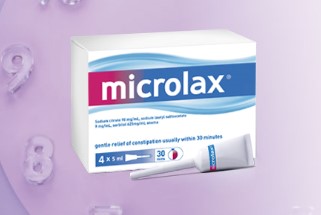
What is constipation?
From a feeling of bloating to difficulty passing a stool, the effects of constipation can cause a range of issues. But despite differing symptoms, it’s a common problem shared by many, and one that can be treated.
Could you have constipation?
Constipation is a really common problem, although few like to talk about it. Though there is a medical definition, everyone has their own personal length of time between bowel movements that feels normal for them. For example, if you are used to passing a stool everyday, going a day without an evacuation may make you feel constipated. Going longer than three days without a bowel movement will cause the stool to become hard and difficult to pass.
Constipation occurs when the stool passes through the large intestine too slowly. When the stool stays in the large intestine too long, the intestine removes too much water, and the stool becomes hard and dry. Going longer than three days without a bowel movement will cause the stool to become hard and difficult to pass. Constipation can also cause your stools to be lumpy, large or small.
Your body’s natural rhythm
Everyone has their own rhythm of digestion, depending on age and diet, and therefore their own personal explanation of what is a ‘normal’ frequency of stools for them. For some people, regular evacuation three times a day is the norm, whereas others feel that evacuation three times a week is normal. What counts in each case is that your own personal rhythm remains normal.
Medical Definition of Constipation
Doctors speak of constipation if evacuation occurs less than three times a week. Symptoms of constipation apart from irregular evacuation can include:
- Evacuation of only small quantities of stool (like rabbit droppings)
- Stool hardness
- Needing to strain to achieve evacuation
- Painful evacuation
- The feeling that the bowel hasn’t completely evacuated
- Flatulence
- Swollen abdomen or abdominal pain
What’s happening to my digestive system during constipation?
If stool evacuation is infrequent or incomplete, the mixture of undigested food and fluid in the intestine becomes denser and denser as water is extracted. The longer this goes on, the more water is extracted and the stool within the rectum hardens and becomes dry. This can lead to feelings of abdominal fullness, flatulence and stomach ache and evacuation with severe straining can be very painful.
How the Human Digestive System Works
The intestine extends from the stomach to the anus and is approximately 8.5 meters in length. Its enormous length is important because the body must extract vital nutrients and water from the ingested food during its passage. The digestive process takes time and ideally should not be interfered with so as to maintain the healthy balance of intestinal flora and not to disturb the absorption of nutrients.
1. Mouth and oesophagus
The first step in the digestive process takes place in the mouth. The teeth chew up the food into smaller pieces, which are then thoroughly mixed with saliva to form a mixture called bolus (chewed food). This action breaks down carbohydrates already present in the food into smaller constituents. After swallowing, the bolus passes along the oesophagus (approx. 25-30 cm long) into the stomach.
2. Digestion in the stomach & small intestine
In the next step, the chewed up food is mixed with gastric acid in the stomach and broken down even more until it becomes a liquid and is called chyme (digested food). At the same time most pathogens and bacteria that may have been ingested along with the food are destroyed by the gastric acid. Special enzymes are released which start the digestion of proteins in the stomach.
It is the small intestine where the absorption of nutrients takes place. The first part of the small intestine is the duodenum (23 to 28 cm long). Here, vital constituents in the mixture, now called the chyme are further broken down into the minutest particles – until now only few individual molecules remain. Fats are converted into fatty acids, proteins become amino acids and carbohydrates turn into glucose. The mucous membrane of the small intestine allows nutrients to pass into the blood stream, which distributes them to the various organs. What remains of the bolus now only contains some indigestible material and liquid.
3. Digestion in the large intestine
The last part of the digestive process takes place in the large intestine where the undigested food remains for up to 24 hours. Here, any vital liquid still present is absorbed by the body and any remaining electrolytes are reabsorbed. The indigestible residue is passed on to the rectum as a firm stool. The large intestine is protected by probiotic bacteria that reduce the growth of harmful bacteria. Maintaining the natural balance in the large intestine is important for your health and well-being.
4. Excretion in the rectum
In normal circumstances, water absorption reduces the volume of the content of the intestine. The stool remains in the rectum until its volume reaches a critical point, which activates receptors in the intestinal tract and triggers an evacuation reflex.
Constipation occurs when too much liquid has been extracted from the content of the intestine. The stool is too dry and hard, which makes normal excretion difficult.
MICROLAX® Enema acts locally in the rectum. It softens a hardened stool, increases its volume and creates the urge to evacuate, generally within 30 minutes after use. Because of this, MICROLAX® Enema has no negative impact on the digestive tract and the natural intestinal flora.
Is constipation dangerous?
In most cases, constipation is harmless. However, if the symptoms persist for longer than two weeks, you should consult a doctor.
If illnesses are ruled out as the cause, constipation is usually not dangerous – though it can seriously affect your sense of well-being. Apart from the symptoms described above, the condition can affect you psychologically: feelings of frustration, loss of control and hopelessness are not uncommon. These feelings often make people with constipation unmotivated and lack energy to go about their daily lives.
Click here to find out how you can deal with your constipation with MICROLAX® Enema.
Types of Constipation
Constipation can be acute (irregular and severe) or frequent (regular). Find out the difference between these types and how to best treat them.
What causes constipation?
Eating too many of the wrong foods, travelling, or simply getting older. Take a look at the different issues that can cause your battle with bowel movements.




